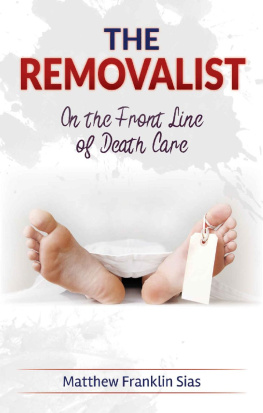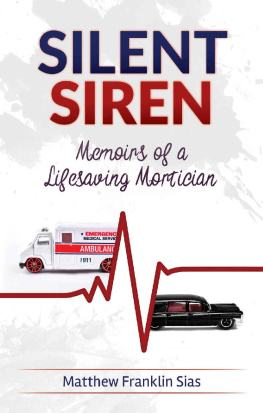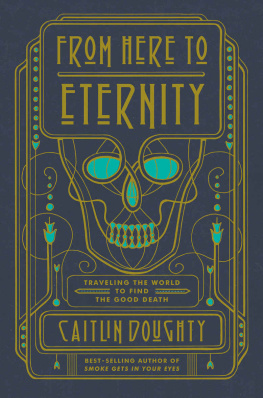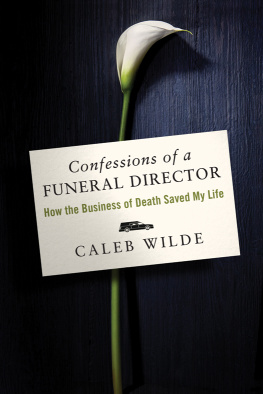The Removalist
On the Front Line of Death Care
Matthew Franklin Sias
 Copyright Matthew Franklin Sias 2018
Copyright Matthew Franklin Sias 2018
All rights reserved. No part of this publication may be reproduced, stored in or introduced into a retrieval system or transmitted in any form or by any means, electronic, mechanical, photocopying, recording or otherwise without prior written permission from the publisher.
This is a work of non-fiction, though most names and some details have been changed to keep me from getting into more trouble than I already find myself in on a daily basis.
Originally self-published by Matthew Franklin Sias in 2017
Published by Vulpine Press in the United Kingdom in 2019
ISBN 978-1-912701-41-4
Cover by Claire Wood
www.vulpine-press.com
For Klaire, a most welcome surprise.
Introduction
Death and taxes are the only two inescapable realities of this earthly life. Both can be put off for years, but in the end, weve all got to pay the Tax Man as well as the Grim Reaper. Since I was never any good at doing anyone elses taxes, much less my own, I somehow fell into the business of working with the dead. I wasnt born into the business, as none of my family members held jobs even tangentially related to mortuary science or forensic medicine. How I popped out of the womb with such an interest in a field from which most people would sprint as fast as they could, I havent a clue. At any rate, Ive been at it a while, and have had the dubious privilege to be witness, hundreds of times, to what remains after a soul has taken leave of the physical.
My first book Silent Siren: Memoirs of a Lifesaving Mortician chronicled both my career in emergency medical services and my experiences in death care. The book spanned a period of over twenty years and attempted to meld my seemingly divergent experiences into a cohesive whole. Whether I was successful at this endeavor is up to the readers.
This book takes off where Silent Siren left offnot in terms of chronology, but as a more in-depth look at one mans experiences solely in the field of death care. My hope is that these short stories will make the reader consider his own mortality and what one would like to be remembered for long after one is gone from this earth. Furthermore, I hope to shed some light on the oft-misunderstood interval between the time a persons heart stops beating and the moment the last shovelful of dirt is tamped down on his grave.
Though I have tried not to make this book a gratuitous gore-fest, death and the changes a body goes through after the heart stops are not pleasant, so be warned. Those with a weak stomach may want to cover their eyes in places. But for those who dont shy away from the unabashed descriptions contained herein, I implore you to read on
Speed Kills
There is something profoundly gloomy about plucking chunks of rain-soaked brain from the grass, especially in the dark, and especially when those chunks are arrayed in a six-yard radius from a dead mans car.
My numb toes squish in sodden socks. Ten minutes into this call and I have already stepped into a muddy morass inconveniently located between my van and what remains of a car so mangled I cant even tell if its an SUV or sedan.
Well, that and my camera wont work properly. What with the rain and the pitch-darkness, the lens wont focus on anything, so I have to resort to aiming my anemic flashlight beam at an object to get a focus. It sort of works, and sort of doesnt.
The beam of the flashlight strikes fractured CDs, glass shards, beer cansand brain tissue. I walk with my red plastic bag and throw the bigger chunks in. If Ive left any smaller bits, the birds will eat them in the morning. The circle of life. The fire siren mounted to a nearby station howls, hailing volunteers to another call being dispatched. Its haunting. Rain pounds.
The accident scene is a study in centrifugal force. After careening out of control, the car flipped end over end multiple times, flinging bits of itselfand its luckless passengeryards away.
The State Patrol detective had surmised that the driver had not been wearing his seat belt, and, as the car flipped, the single driver had pin-balled around the interior until the windows shattered and his head was exposed to the exterior. With a couple of more flips, the contents of his cranium had been flung in an arc pattern spanning several yards.
The rear bumper, bearing the license plate, is in the street. I take note of the number for my report. The car is in a grassy right-of-way next to several homes. The lights are on in the homes and a few onlookers have gathered to observe the results of the mayhem.
The Patrol sergeant points out a middle-aged man standing near the patrol cars, holding an umbrella. Hes a neighbor. Thinks he may know where this guy lives.
I introduce myself and attempt to scribble his name on my damp report form before realizing that pens dont write in the rain. Pencils do, but I dont have one with me.
Terrible driver, says the man. Used to drive like a bat out of hell through here every day. Kids and pets in this neighborhood. I figured something would happen eventually.
And happen it did. The trail of debris is nearly a half-block long.
He lives in the marina, says the man. He and some kid. Maybe his son.
I thank him for his time and finally turn my attention to the largest chunk of the car and its mortal contents.
Squished in the passengers seat, dressed in a leather jacket and jeans, is what is left of Randy Moore, age fifty-three, according to his drivers license. The top of his head is gone, fractured skull gaping like the cracked shell of a crab, contents evacuated, pink flaps of hairy scalp splayed to the sides. One eyeball, still tethered by an optic nerve, lolls onto Randys cheek. The other is pushed deeply into the socket. Absurdly, his right index finger points at the dash, at the speedometer to be exact, as though he were indicating the speed at which he was traveling. The speedometer is pegged at eighty miles per hour.
The removal from the vehicle is fairly straightforward. Im able to pry open the passenger door pretty easily. A police officer holds it open for me as I yank Randys remains out and slide them onto the rain-slick plastic liner that lies on the gurney. Its an indelicate process at best, with nowhere near the care afforded to the living, but Randy isnt around to experience it. I slide a pant leg up to attach an ID tag. Instead of flesh, I am greeted by titaniuman artificial leg. Perhaps as the result of a previous car accident?
I load Randy into the van as police strobe lights reflect off the pounding raindrops, and then make my way back to the morgue, where under more controlled and better lit conditions, I take additional photographs and measurements of the body.
As with most any case, notification of the next of kin is by far the worst part. I sift through the multitude of dilapidated and dog-eared cards in the mans wallet until I come upon a business card for A.D. Moore Construction.
I make the assumption that A.D. Moore is a relative and dial the number.
It seems to come as no surprise to the elderly Mr. Moore that his son has died. Hed had his brushes with the law, with alcohol, and with excessive speed. Wearily, almost resignedly, he hands the phone to his other son, Randys brother.
The son explains that Randy had moved out west for the winter from Wisconsin to be with his son, who lived on a boat. It was too cold for Randy in Wisconsin, so he chose here, which seemed odd. I gaze out the rain-streaked office window. Wouldnt southern California be a better choice?













 Copyright Matthew Franklin Sias 2018
Copyright Matthew Franklin Sias 2018